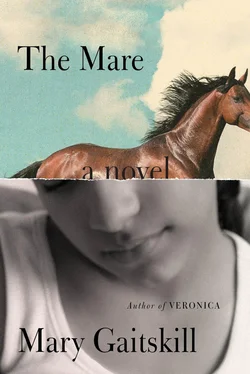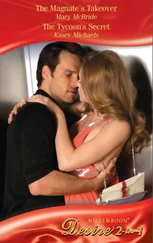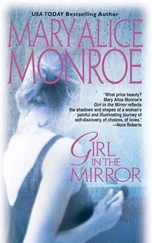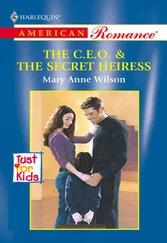I wiped my mouth with my shirt. The black closed in and then parted; the grass was so green beneath me. I felt her breath on me. Then her nose against my shoulder. The grass was so green. I lifted my face and she lipped my hair. I almost laughed because she had come back, but then I saw she was scared. She was scared, but she still came back to see if I was okay. I could not make her more scared.
The blackness cleared. I stood up and touched her shoulder with both my hands. She shied away. I made my voice softer and I talked to her like she was a kitten. I said I was sorry I said those things, that I wasn’t talking to her. I said I would never say those things again. I tried to kiss her and to hug her. She shied away again. I tried again, and she moved away again, stronger this time, like I was scaring her. I didn’t understand and it hurt me. I needed to feel her, but I couldn’t make her more scared. Her skin was shining, and her head was up, nervous, even though her eyes were trusting me. I put my head down and moved close enough to put my hand on her shoulder. She stayed. I felt her muscles, her blood. I felt her. I remembered suddenly how it was when I walked to the barn with Ginger that first time, how all the green was too much, too open, and I knew: She didn’t feel safe enough to hug in the open. Like she knew I understood, she put her head down and began to eat the grass. I petted her neck and then picked up the reins. I let her eat for a few minutes — it made me feel calm to watch her eat, looking a little piggy with her snout. Then when I was ready I said, “Come on” and pulled her head up. I led her to the fence like it was a mounting block. I climbed up on it. She shied away at first, but I talked her back. She saw what I was doing; she let me. I sat on her and swung my hair behind me. The sky was huge and bright, but it was touching me now, it was friendly, and the huge brightness of the grass stretched before me. I started her at a walk. This was my place. No one would ever be in this place but me and my horse. No man, not even children; they would never come here with me. This place was only for me and my mare.
We were going at a trot when we saw Pat on Graylie and Beverly on Diamond Chip. I slowed to a walk. They stopped and they stood there waiting, Pat with her face like she just saw God, Beverly like somebody’d stuck a rake in her face.
“Get off that goddamned horse,” Beverly said, “before you do any more damage.”
I got off. Pat got off Graylie. She was trying to make her face mad, but I could see she was really something else and she was barely holding it back. She said, “Do you realize how lucky you are that you didn’t get hurt?”
Beverly said, “Do you realize how lucky I am that I didn’t get killed? He came up on me and hit the back of my knees. He could’ve kicked my skull in.”
“Both of you could’ve been killed,” said Pat.
“I’m sorry, Miss Beverly,” I said. “I’m sorry, Miss Pat. But Fiery Girl wouldn’t kill me. She loves me.”
“Don’t be a fool!” Pat said. “She’s an animal!”
“I know. But she loves me.” Then I fainted.
Jesus Christ. Even her, the tough black girl from the city — or Puerto Rican, or whatever she is — even she’s been ruined by the Disneyfied horse-snot they sell in the multiplex. Love and self-esteem, love and self-esteem — love is good for babies and that’s it. Yes, you make a horse good by raising it up with a little love and a lot of discipline. But you make a horse great by making it feel like shit. Because it knows it is not shit and it will turn itself inside out to prove it to you. Sure you give it love, just a touch. And then you make it crave the love, make it try to please you for another little taste — it will turn itself inside out to show you it’s good; you make that horse prove it over and over, every time. If that horse is worth anything, it will pull up everything it’s got for you and it will find what it’s worth and be more and more proud. It will know it can take whatever you got and sometimes it will give it back. But it will know its worth. And it will do anything to make you know it. It will die to make you know it. Not that I’d go that far. That would be stupid. Because that horse is worth more than me. The dumb animal just doesn’t know it. It’s me that’s shit. Not him.
When I saw Pat and Velvet come into the house I thought, She’s won a prize. Because that’s what their faces said, even when Pat said, “There’s been an accident.” Velvet smiled and said, “I’m okay. I just fell off.”
I felt a lump forming under her warm hair; there was a little blood. I asked if she’d blacked out. She said yes and I told her to go get her Medicaid card. I thought of Mrs. Vargas and began to sweat. Velvet went up the stairs and I said, “What happened?” Pat said the girl had broken the rules of the barn and that she’d been expelled.
“What did she do?”
“Improperly handled a horse, rode bareback without permission or supervision, endangered herself and others. She fell off the horse and passed out. She’s probably got a concussion, but she could’ve broken her neck.”
“My God!”
As Anglo as she was, she suddenly reminded me of Mrs. Vargas; powerfully in her body, peering out of it with the expression of someone looking at a world she didn’t fully understand and didn’t think much of. She said, “I’m pretty sure she’s okay; she was only unconscious for seconds. But call me tomorrow and let me know.”
On the way to the hospital, I asked Velvet what she’d done and she said, “I rode my mare.” Her face was withdrawn, like into some powerful dream, but something exalted and private radiated from her. Consequences, I thought. Why doesn’t she understand?
“They’re not going to let you go back to the barn.”
“Miss Pat will. She told me I can even come to her house.”
I thought, Yeah, like I’m going to homeschool you; my heart went dark and sore. We pulled into the hospital parking lot. She said, “I stopped this other horse from being hurt,” and I gathered the crazy trainer had been distracted by Velvet’s antics and gotten knocked down. Which was, I guess, the idea.
As we parked, I flashed on all the movies I’d taken her to or rented for her: movies where some stupid mean adult is basically knocked down by the heroine and everybody thinks it’s great. I said, “This isn’t a movie, you know.”
She looked at me and said, “ Wha ?”
At the desk they said they couldn’t treat her without her mother’s permission. I said, “Does anyone here speak Spanish?” and the receptionist said, “I’m sure there’s someone.”
I thought, It’s all over now. And Michael came into my mind with the force of despair. I looked at Velvet; I should not have brought her here. Clearly there was nothing wrong with her; she was alert and even looking rather pleased as the receptionist called for someone who could speak to her mom. I thought, I’ve lost her. I pictured my life with Paul before she came into it and it seemed intolerably bleak.
Velvet smiled as she picked up the phone and said, “Hola, Mami.”
I thought again of Michael, of the way he touched his finger to his lips: Shhh. We barely even spoke when I saw him, yet he seems closer now than Paul. How is that possible? How could something I barely remember, that happened in a small room so long ago, seem more real than my real life?
The translator arrived, a helpful girl with PANIC AT THE DISCO on her shirt.
Ginger looks like she’s about to cry and I’m like, But I’m okay— then I go, Right, she’s scared of my mom. But I’m not stupid enough to call my mom. I call my cousin and say, “Hola, Mami.” Nobody who can speak Spanish is even there yet, so I tell Donna I can’t bother my mom at work, but I bumped my head and Ginger wants to be sure I’m okay, could she be my mom and give permission? She asked questions, but then the translator came, this girl who hardly knew Spanish, and I knew it was okay, and they let me see the doctor. He tapped my knees with a little hammer and made me balance on one leg and count my fingers. He asked if I knew where I was and where I was from. He wanted to know the name of my horse; he smiled when I said, “Fiery Girl.”
Читать дальше












